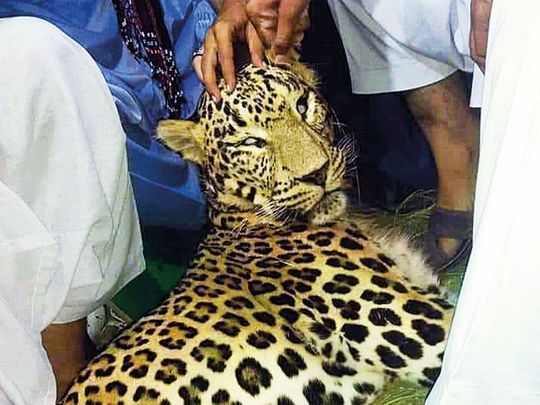
Islamabad: A heart-breaking video emerged showing dozens of men surrounding a leopard and pulling its whiskers. The big cat was hunted down and killed by locals of Darra Adam Khel in Khyber-Pakhtunkhwa (KP) on Wednesday for attacking farm animals and posing a threat to humans.
‘This leopard has devoured dozens of goats of mostly poor people after which many people were after the animal. Finally, two youth succeeded in killing the big cat’ reads the caption of the video shared by a citizens organisation called ‘Darra Adam Khel Ki Awaz’ (Voice of Darra Adam Khel). ‘Such animals are the beauty of the mountains but unfortunately they have become a curse for locals.’
The video and photos shocked Pakistani netizens, especially the mistreatment suffered by the leopard. This is “such a shameful and ignorant act,” said a comment posted by Hassan Sardar Shan, urging “awareness [campaigns] by the government to protect the animals”.
What shocked many was the comment by a netizen named Shah Syed, who claimed that “three big cats have been killed in the area in three months,” highlighting the serious danger to animals. Most people, while blaming the culprits, called for strict action from the wildlife departments. “It is natural for a hungry animal to attack the cattle but it is unnatural for humans to kill the animals in a cruel way,” commented an animal lover, Salma Khan.
When Gulf News contacted the KP wildlife department, the chief conservator wildlife Dr Mohsin Farouq first expressed his regret and then explained the reason for such occurrences in the former tribal region. “The region cannot be compared to other areas of Pakistan as wildlife laws simply did not exist there. It is only now, after the merger, that the KP wildlife department has extended its jurisdiction to the districts.”
Dr Farouq said his organisation hopes to introduce and implement wildlife laws in the region but it will at least take three years as “any abrupt changes would not be successful”. After setting up offices, the wildlife organisation would first begin with resource assessment and survey of species and designate protected areas. “Awareness of conservation issues among schoolchildren and communities will be part of the core activities of the department,” he said.
Pakistan’s tribal region, spread over 27,220 square kilometres, is said to be home to diverse animal species, including snow leopard, Sulaimani Markhor, leopard cat, Kabul Markhor, rabbits, rare eagles and others.
Conflicts between humans and animals are a serious concern worldwide due to expanding human populations and loss of natural habitat. In Pakistan, human-wildlife conflict is reported in different parts, which is being tackled by introducing conservation of wild species. Such encounters lead to tragic loss of wild creatures as well as crop and property damage, livestock depredation, human injury and death.
WWF-Pakistan, which considers leopard as one of its priority species, suggests that raising awareness and education are key elements to reduce human-wildlife conflicts. “Awareness has always been a major component of the training, documentaries and brochures to educate the local communities about the importance of the common leopard, which has significantly reduced the killings,” WWF-Pakistan Climate, Energy & Water Director Dr Masoud Arshad told Gulf News. The organisation focuses on priority species in priority areas, where conflict with humans poses a serious threat to their continued survival. Compensating local farmers and community-based livestock insurance schemes have also proved to be successful interventions to reduce economic losses of the locals and mitigate human-wildlife conflicts.












